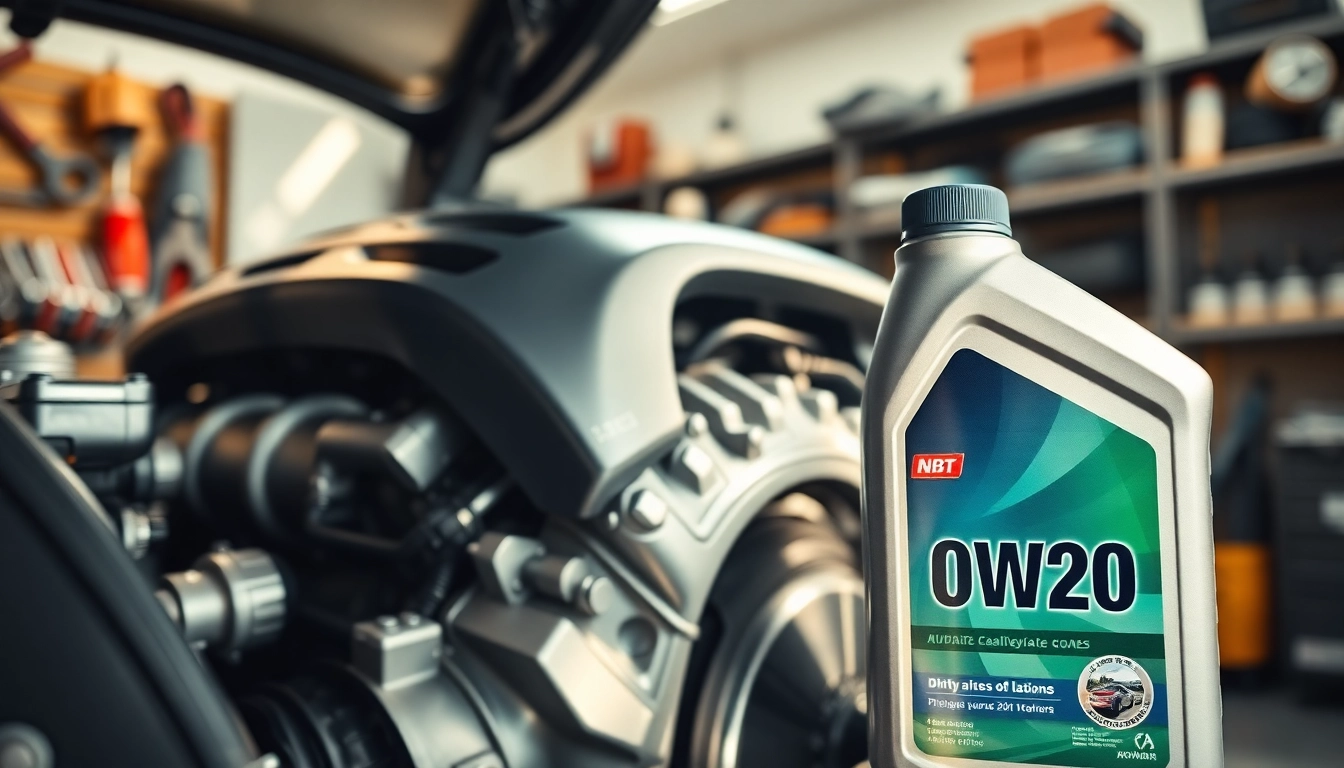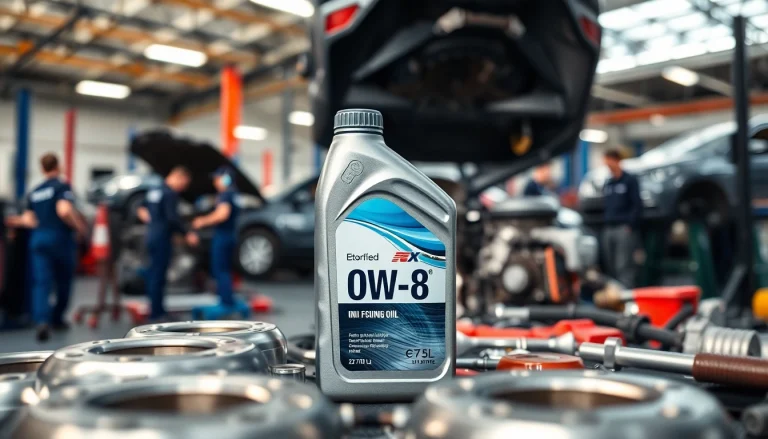What is 0W20 Oil?
0W20 oil is a lightweight, primarily synthetic oil designed for modern engines. It stands out due to its unique viscosity rating, which indicates how it behaves at different temperatures. The “0W” signifies its winter viscosity rating, meaning it flows easily at low temperatures, while the “20” indicates its viscosity at operating temperature. This oil is engineered to meet strict performance standards, providing excellent protection for your engine in various conditions. For more detailed insights on this oil, refer to this 0w20 oil resource.
Understanding Viscosity Ratings
The viscosity rating of motor oils is crucial for effective engine performance. It represents the oil’s resistance to flow. Generally, a lower winter rating (like 0W) means the oil is thinner at low temperatures, which is vital for quick startup. The second number (20 in this case) refers to the oil’s viscosity at higher temperatures—typically when the engine is at operating temperature. Understanding this rating is essential for selecting the right oil for your vehicle, particularly in climates that experience significant temperature variations.
Comparison with Other Oil Grades
When comparing 0W20 oil with other oil grades such as 5W30 or 0W30, it is vital to consider their respective viscosity properties. While 5W30 oil offers similar winter performance but has a thicker viscosity at operating temperatures, 0W20 oil is ideal for vehicles designed with tighter engine tolerances, as it flows more freely during cold starts. This enhanced flow can lead to reduced engine wear and improved fuel efficiency.
Furthermore, vehicles that require 0W20 oil often have advanced technology that seeks to maximize fuel economy, making 0W20 a preferred choice for modern, energy-efficient engines.
Applications of 0W20 Oil in Modern Vehicles
0W20 oil is commonly recommended for a wide range of vehicles, especially those equipped with turbocharged engines or hybrid systems, including models from popular manufacturers like Toyota, Honda, and Ford. Many manufacturers endorse the use of 0W20 to help meet stringent fuel efficiency regulations and enhance engine life. Its application isn’t limited to just gasoline engines; it is increasingly seen in various engine types, including some diesel engines, due to its superior lubrication properties at low temperatures.
Benefits of Using 0W20 Oil
Using 0W20 oil in your engine presents numerous advantages that contribute to overall vehicle performance, longevity, and efficiency.
Enhanced Engine Performance
One of the most significant benefits of 0W20 oil is its ability to maintain superior viscosity across a wide temperature range. This property allows for faster circulation to critical engine parts, leading to reduced friction and wear. Consequently, engines using 0W20 oil often demonstrate better throttle response, quiet operation, and less engine noise, which translates to a smoother driving experience.
Fuel Efficiency Improvements
Another essential benefit of 0W20 oil is its contribution to improved fuel economy. Thinner oils like 0W20 reduce drag on engine components, allowing engines to operate more efficiently. Studies indicate that switching from a conventional 5W30 to a full synthetic 0W20 can enhance fuel efficiency by 1-2 miles per gallon. For drivers who frequently cover long distances or who are highly aware of their vehicle’s fuel consumption, these savings can be significant.
Environmental Considerations and Emissions
Utilizing 0W20 oil can also lead to lower vehicular emissions, a critical consideration given today’s environmental concerns. Engines operating with 0W20 oil produce fewer emissions compared to those using thicker oils. As manufacturers strive to meet stringent environmental regulations, using a low-viscosity oil like 0W20 helps in reducing carbon footprints. This oil aids in meeting the requirements set forth by the EPA, making it a more sustainable choice for conscientious drivers.
How to Choose the Right 0W20 Oil
Selecting the appropriate 0W20 oil involves considering several factors, including brand reputation, oil formulation, and vehicle specifications. Here’s a detailed guide to help you make an informed choice.
What to Look for in Quality Brands
Not all oils are created equal. When searching for high-quality 0W20 oil, consider well-established brands known for their rigorous testing and adherence to industry standards, such as Mobil 1, Castrol, and Valvoline. Look for oils meeting specifications from manufacturers like API (American Petroleum Institute) and ILSAC (International Lubricant Standardization and Approval Committee). These certifications indicate that the oil meets necessary performance standards.
Additionally, consider oils that provide advanced additives for further protection against wear and deposits. Synthetic oils, which tend to offer enhanced thermal stability and flow performance at low temperatures, are often recommended.
Understanding Synthetic vs. Conventional Oils
0W20 oil is primarily available in synthetic formulations. Synthetic oils are engineered using chemical compounds designed to mimic the characteristics of conventional lubricants while offering enhanced performance. They provide better protection against breakdown in high temperatures and offer superior performance at low temperatures compared to conventional oils.
While synthetic oils can be more expensive initially, their longer oil change intervals and improved engine efficiency often offset the additional cost. Drivers looking for maximum engine protection and performance should opt for synthetic 0W20 oil.
Reading Oil Labels and Specifications
When purchasing 0W20 oil, it’s essential to read and understand the oil labels. Key information includes viscosity ratings, performance specifications, and any special features or claims made by the manufacturer. Pay attention to the API service category; for optimal performance, choose oils with “SN,” “SN Plus,” or “SP” ratings, as these provide the most recent advancements in engine protection and performance.
Furthermore, if your vehicle has specific needs, such as high mileage or severe driving conditions, consider oils formulated for those specific applications to ensure optimal protection.
Common Questions About 0W20 Oil
With the rising popularity of 0W20 oil, many drivers have questions about its compatibility and maintenance practices. Here are some of the most common inquiries.
Is 0W20 Oil Suitable for My Vehicle?
The suitability of 0W20 oil is generally dictated by the manufacturer’s specifications outlined in the owner’s manual. If your car’s manual recommends 0W20, you should use it without hesitation. However, if you’re in doubt, consult with a qualified mechanic or refer to your vehicle’s manual. Always prioritize using oil that meets the required specifications for your engine to avoid performance issues.
Can I Mix Different Oil Types?
Mixing different oil types is not recommended as it can lead to a decrease in performance. If you must mix oils, ensure that they share the same viscosity rating and are both synthetic or both conventional. However, it’s always best to drain your old oil and replace it with the same type that your vehicle manufacturer recommends for optimal performance.
How Often Should I Change 0W20 Oil?
Oil change intervals can vary based on the vehicle manufacturer’s recommendations, driving conditions, and oil quality. Typically, synthetic 0W20 oil can last between 5,000 to 10,000 miles between changes, but always refer to your vehicle’s manual for specific intervals. Keeping track of mileage and changing the oil regularly helps maintain engine health and performance.
Best Practices for Using 0W20 Oil
To ensure that your engine runs smoothly and efficiently with 0W20 oil, following best practices during use and maintenance is crucial.
Storage and Handling Tips
Proper storage of motor oil is vital to ensure its longevity and effectiveness. Store oil containers upright in a cool, dry place away from direct sunlight to prevent degradation. Avoid storing oil in areas with extreme temperatures, which can negatively affect its properties. Additionally, check oil containers for damage or leaks before use.
DIY Oil Change: Steps and Precautions
Performing your own oil change can save money and give you a sense of accomplishment. Here are the steps to follow:
- Gather the necessary tools, including a wrench, oil filter wrench, funnel, new oil filter, and your 0W20 oil.
- Warm up the engine slightly for a few minutes to help the oil drain smoothly, then switch it off and let it cool.
- Locate the oil drain plug and place a catch pan underneath. Unscrew the plug and let the old oil drain completely.
- Replace the oil filter, ensuring it is properly seated and does not leak.
- Replace the drain plug securely and funnel in new 0W20 oil until it reaches the correct level, usually indicated by a dipstick.
- Run the engine for a minute, check for leaks, and double-check the oil level, topping up if necessary.
Maintaining Your Engine for Longevity
To prolong the life of your engine, focus on regular maintenance practices. Adhere to the recommended oil change intervals, monitor oil levels frequently, and check for any signs of leaks or engine performance issues. Also, preventive maintenance practices, such as replacing air filters and fuel filters, contribute to efficient engine performance.
Investing time and effort in proper oil management and regular check-ups helps ensure your engine runs smoothly for years to come. In summary, choosing and using 0W20 oil responsibly can enhance your vehicle’s overall performance, making it a smart choice for modern engine requirements.








